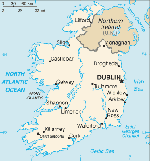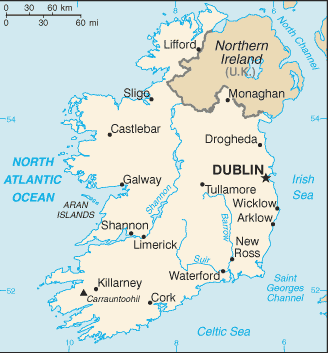 Ireland
Ireland
Country Specific Information
On this page » |
|
June 25, 2009
COUNTRY DESCRIPTION: 
 Ireland is a highly developed democracy with a modern economy. Tourist facilities are widely available. Read the Department
of State Background Notes on Ireland for additional information.
Ireland is a highly developed democracy with a modern economy. Tourist facilities are widely available. Read the Department
of State Background Notes on Ireland for additional information.
REGISTRATION: Americans living or traveling in Ireland are encouraged to register with the nearest U.S. Embassy or Consulate through the State Department’s travel registration web site so that they can obtain updated information on travel and security within Ireland. Americans without Internet access may register directly with the Embassy in Dublin. By registering, American citizens make it easier for the Embassy to contact them in case of emergency.
ENTRY/EXIT REQUIREMENTS: A passport is necessary, but a visa is not required for tourist or business stays of up to three months. Visit the Embassy of Ireland web site for the most current visa information, or contact the Embassy at 2234 Massachusetts Avenue, NW, Washington, DC 20008, tel: 1-202-462-3939, or the nearest Irish consulate in Boston, Chicago, New York or San Francisco.
Information about dual nationality or the prevention of international child abduction can be found on our website. For further information about customs regulations, please read our Customs Information Sheet.
The U.S. Department of State is unaware of any HIV/AIDS entry restrictions for visitors to or foreign residents of Ireland.
SAFETY AND SECURITY: Ireland remains largely free of terrorist incidents. While the 1998 ceasefire in Northern Ireland is holding, there have been incidents of violence in Northern Ireland associated with paramilitary organizations. These have the potential for some spillover into Ireland. Travelers to Northern Ireland should consult the Country Specific Information sheet for the United Kingdom and Gibraltar.
Several Americans have reported incidents of verbal abuse, apparently in reaction to U.S. policy on the war on terrorism. As elsewhere in Europe, there have been public protests, which for the most part were small, peaceful and well-policed. Americans are advised, nonetheless, to avoid public demonstrations in general and to monitor local media when protests occur.
For the latest security information, Americans traveling abroad should regularly monitor the Department of State’s Bureau of Consular Affairs’ web site, where the current Travel Warnings and Travel Alerts, as well as the Worldwide Caution, can be found.
Up-to-date information on safety and security can also be obtained by calling 1-888-407-4747 toll-free in the United States
and Canada or, for callers outside the United States and Canada, a regular toll line at 1-202-501-4444. These numbers are
available from 8:00 a.m. to 8:00 p.m. Eastern Time, Monday through Friday (except U.S. federal holidays).
The Department of State urges American citizens to take responsibility for their own personal security while traveling overseas.
For general information about appropriate measures travelers can take to protect themselves in an overseas environment, see
the Department of State’s A Safe Trip Abroad.
CRIME: Ireland has a low rate of violent crime. There have been a limited number of incidents in which foreigners and tourists have been victims of assault, including instances of violence toward those who appear to be members of racial minority groups. In addition, there have been several reported assaults in Dublin by small, unorganized gangs roaming the streets in the early morning hours after the pubs close. There is a high incidence of petty crime in major tourist areas – mostly theft, burglary and purse snatching. Thieves target rental cars and tourists, particularly in the vicinity of tourist attractions, and some purse and bag-snatching incidents in these areas have turned violent, especially in Dublin. Travelers should take extra caution to safeguard passports and wallets from pickpockets and bag-snatchers.
Crimes involving credit and debit cards and automated teller machines (ATMs) are also a concern. Travelers should protect their PIN numbers at all times and avoid using ATMs that appear to have been tampered with. There has been an increase in Ireland of the use of “skimmers” on ATMs, especially in tourist areas. Skimmers are usually small electronic devices that are attached to the outside of an ATM in order to “skim” the ATM or credit card data for later criminal use. Most ATMs in Ireland now have electronic warnings about their use, and advise customers to look closely at the ATM before using it.
CRIMINAL PENALTIES: While in a foreign country, a U.S. citizen is subject to that country's laws and regulations, which sometimes differ significantly from those in the United States and may not afford the protections available to the individual under U.S. law. Penalties for breaking the law can be more severe than in the United States for similar offenses. Persons violating Ireland’s laws, even unknowingly, may be expelled, arrested, or imprisoned. Penalties for possession, use or trafficking in illegal drugs in Ireland are severe, and convicted offenders can expect long jail sentences and heavy fines. Engaging in sexual conduct with children or using or disseminating child pornography in a foreign country is a crime, prosecutable in the United States. Please see our information on Criminal Penalties.
INFORMATION FOR VICTIMS OF CRIME: The loss or theft abroad of a U.S. passport should be reported immediately to the local police and the nearest U.S. Embassy
or Consulate. If you are the victim of a crime in Ireland, in addition to reporting to local police (Gardai), please contact
the U.S. Embassy in Dublin for assistance. The Embassy staff can, for example, assist you in finding appropriate medical
care, contacting family members or friends, and learning how funds can be transferred. Although the investigation and prosecution
of the crime are solely the responsibility of local authorities, consular officers can help you to understand the local criminal
justice process and to find an attorney if needed. The Irish Tourist Assistance Service (ITAS) is a free nationwide service
offering support and assistance to tourists who are victimized while visiting Ireland. If you are a tourist victim of crime,
report the incident to the nearest Garda Station (police station), which will contact ITAS. All tourist victims of crime
are referred to ITAS by the Gardai.
The local equivalent to the “911” emergency line in Ireland is 999 or 122.
Please see our information on Victims of Crime, including possible victim compensation programs in the United States.
SPECIAL CIRCUMSTANCES: Most Irish banks will not accept U.S. $100 bills. ATMs are widely available, but some, particularly in rural areas, may not accept cards from U.S. banks. Credit cards are widely accepted throughout Ireland. A number of travelers have been told by their airline that their passport must remain valid for six months after their entry into Ireland. The Government of Ireland has advised that this is a recommendation of the airline industry and is not an Irish legal requirement. Travelers must be in possession of a valid passport to travel. Please see Customs Information.
MEDICAL FACILITIES AND HEALTH INFORMATION: Modern medical facilities and highly skilled medical practitioners are available in Ireland. Because of high demand, however,
access to medical specialists can be difficult and admissions to hospitals for certain non-life-threatening medical conditions
may require spending significant periods of time on waiting lists. Those traveling to or intending to reside in Ireland who
may require medical treatment while in the country should consult with their personal physicians prior to traveling. Over-the-counter
medication is widely available. Irish pharmacists may not be able to dispense medication prescribed by U.S. physicians and
may direct you to obtain a prescription from an Irish doctor before providing you with your required medication.
A list of Irish general practitioners in each area of Ireland may be obtained from the web site of the Irish College of General Practitioners. Emergency services usually respond quickly.
Information on vaccinations and other health precautions, such as safe food and water precautions and insect bite protection,
may be obtained from the Centers for Disease Control and Prevention’s (CDC) hotline for international travelers at 1-877-FYI-TRIP
(1-877-394-8747) or via the CDC’s website. For information about outbreaks of infectious diseases abroad, consult the World Health Organization’s (WHO’s) web site. Further health information for travelers is available from the WHO.
FOOT AND MOUTH DISEASE: The Irish Department of Agriculture and Food advises all incoming passengers to Ireland that the current foot and mouth situation
in Great Britain represents a high risk of the spread of disease to Ireland. If you are traveling from Great Britain to Ireland
and have visited a farm with cattle, sheep, goats or pigs on your travels, you must report to the Irish Department of Agriculture
and Food office at the port of entry. Fresh meat or unpasteurized milk products purchased in Great Britain may not be brought
into Ireland. If you are carrying any of these products, they must be disposed of in the bins provided at the port of entry.
For further information, please visit the Irish Department of Agriculture, Fisheries and Food.
MEDICAL INSURANCE: The Department of State strongly urges Americans to consult with their medical insurance company prior to traveling abroad to confirm whether their policy applies overseas and whether it will cover emergency expenses such as a medical evacuation. Please see our information on medical insurance overseas.
TRAFFIC SAFETY AND ROAD CONDITIONS: While in a foreign country, U.S. citizens may encounter road conditions that differ significantly from those in the United
States. The following information concerning Ireland is provided for general reference only and may not be totally accurate
in a particular location or circumstance.
As driving is on the left side of the road in Ireland, motorists without experience in left-drive countries should be especially
cautious. Tourists driving on the wrong side of the road are the cause of several serious accidents each year. Turning on
red is not legal in Ireland. The vast majority of rental cars are manual transmission; it can be difficult to find automatic
transmission rental cars. Road conditions are generally good, but once travelers are off main highways, country roads quickly
become narrow, uneven and winding. Roads are more dangerous during the summer and on holiday weekends due to an increase
in traffic. As in the United States, police periodically set up road blocks to check for drunk drivers. Penalties for driving
under the influence can be severe. More information on driving in Ireland can be found on the U.S. Embassy in Dublin‘s web site.
For specific information concerning Irish driving permits, vehicle inspection, road tax and mandatory insurance, please visit
the official tourism guide for Ireland.
Taxis are reasonably priced but availability varies with time of day and location. Bus service in the cities is generally
adequate, although many buses are overcrowded and frequently run late. Intercity bus and train services are reasonably good.
Please refer to our Road Safety page for more information.
AVIATION SAFETY OVERSIGHT: The U.S. Federal Aviation Administration (FAA) has assessed the Government of Ireland’s Civil Aviation Authority as being in compliance with International Civil Aviation Organization (ICAO) aviation safety standards for oversight of Ireland’s air carrier operations. For more information, travelers may visit the FAA’s web site.
CHILDREN'S ISSUES: For information see our Office of Children’s Issues web pages on intercountry adoption and international parental child abduction.
EMBASSY LOCATION: The U.S. Embassy is located at 42 Elgin Road, Ballsbridge, Dublin 4. The Embassy can be reached via phone at 353-1-668-8777, after hours number 353-1-668-9612, fax 353-1-668-8056.
* * *
This replaces the Country Specific Information for Ireland dated December 2, 2008, without substantive changes.

